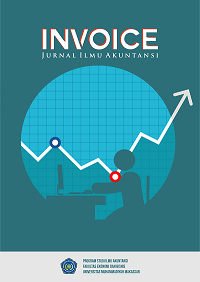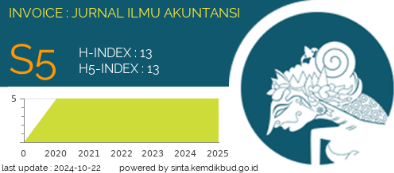PENGARUH ISLAMICITY PERFORMANCE INDEX DAN ISLAMIC SOCIAL REPORTING TERHADAP KINERJA KEUANGAN PERBANKAN SYARIAH DI INDONESIA
DOI: https://doi.org/10.26618/inv.v3i1.4971
Abstrak
Abstract
This study aims to test empirically the effect of the Islamic performance index and Islamic social reporting on financial performance as proxied by Return on assets. The research was conducted at Islamic Commercial Banks registered with the Financial Services Authority in 2014-2019 with the sampling method using purposive sampling. The analysis method used is multiple linear regression. The results of hypothesis testing in this study indicate that partially the profit sharing ratio has no effect on financial performance. Zakat performance ratio has a positive effect on financial performance and Islamic social reporting has a negative effect on financial performance. Simultaneously, profit sharing ratio, zakat performance ratio and Islamic social reporting have a positive effect on financial performance
Keywords : Profit Sharing Ratio; Zakat Performance Ratio; Islamic social reporting ; financial performance
Referensi
Akhmad, A., & Marsuni, N. S. (2019). Causality Relationship of Poverty, Unemployment Rate, and Economic Growth in South Sulawesi Province. Jurnal Ekonomi Balance, 15(2), 231-241.
Andraeny, D., & Putri, D. D. (2017). Islamicity Financial Performance Index in Indonesian Islamic Banks. Shirkah: Journal of Economics and Business, 2(3). https://doi.org/10.22515/shirkah.v2i3.170
Azhar Susanto. 2013. Sistem Informasi Akuntansi. Bandung: Lingga Jaya.
Dewanata, P., Hamidah, H., & Ahmad, G. N. (2016). The Effect of Intellectual Capital and Islamicity Performance Index to the Performance of Islamic Bank in Indonesia 2010-2014 Periods. JRMSI - Jurnal Riset Manajemen Sains Indonesia, 7(2), 259. https://doi.org/10.21009/jrmsi.007.2.04
Dotulong, Ilham, Niswatin, M. Valentina. 2015. Pengaruh Penggunaan Teknologi Informasi dan Keahlian Penggunaterhadap Kualitas Informasi Akuntansi (Studi Empiris pada Diler Mobil di Kota Gorontalo). Jurnal Akuntansi Universitas Negeri Gorontalo.
Evania, Nova. 2016. Pengaruh Penggunaan Teknologi Informasi, Keahlian Pemakai dan Intensitas Pemakaian Terhadap Kualitas Informasi Akuntansi (Studi Pada Satuan Kerja Perangkat Daerah Kabupaten Indragiri Hulu). JOM Fekon, Volume 3 Nomor 1, hal 635-649.
Fitriyani, Riska. 2014. Pengaruh Penggunaan Teknologi Informasi, Keahlian Pemakai dan Intensitas Pemakaian terhadap Kualitas Informasi Akuntansi. Jurnal Ekonomi dan Bisnis Universitas Bengkulu.
Fitria, S., & Hartanti, D. (2010). Studi Perbandingan Pengungkapan Berdasarkan Global Reporting Initiative Indeks Dan Islamic Social Reporting Indeks. Simposium Nasional Akuntansi. Purwokerto. Proceeding.
Fowzia, R., & Nasrin, M. 2011. Appreciation of Computerized Accounting System in Financial Institutions in Bangladesh. World Review of Business Research, I.
Ghozali, Imam. 2016. Aplikasi Analisis Multivariate dengan Program SPSS. Semarang: Badan Penerbit UNDIP.
Hall, James. 2013. Sistem Informasi Akuntansi, Edisi 4. Jakarta: Salemba Empat.
Haniffa, R. (2002). Social Reporting Disclosure an Islamic Perspective. Indonesian Management & Accounting Research.
Hameed, S., et al. (2004). Alternative Disclosure and Performance Measures for Islamic Banks. https://doi.org/10.1017/CB09781107415324.004
Jogiyanto. 2003. Sistem Teknologi dan Informasi. Yogyakarta: AndiYogyakarta.
Khasanah, A. N. (2016). Pengaruh Intellectual Capital Dan Islamicity Performance Index Terhadap Kinerja Keuangan Perbankan Syariah Di Indonesia. Nominal, Barometer Riset Akuntansi dan Manajemen, 5(1), 1–18. https://doi.org/10.21831/nominal.v5i1.11473
Landau, Siti Nurannisa. 2018. Pengaruh Penggunaan Teknologi Informasi, Keahlian Pemakai dan Intensitas Pemakaian terhadap Kualitas Informasi Akuntansi pada Satuan Kerja Perangkat Daerah (SKPD) Kota Medan. USU Medan.
Lizardi, A. F. (2017). Pengaruh Islamicity Performance Index dan Intellectual Capital terhadap Tingkat Profitabilitas.
Maisaroh, S. (2015). Pengaruh intellectual capital dan islamicity performance index terhadap profitability perbankan syariah Indonesia. Universitas Islam Negeri Maulana Malik Ibrahim.
Marsuni, N. S. (2019). Pengaruh Praktik Islamic Corporate Social Responsibility (ICSR) Terhadap Kinerja Keuangan Pada Bank Umum Syariah Periode 2014-2018. Skripsi, Universitas Muhammadiyah Makassar, Makassar.
Marsuni, N. S. (2021). Effective Strategy in Overcoming Challenges in Implementing Carbon Tax Policy. GoodWill Journal of Economics, Management, and Accounting, 1(1), 24-29.
Marsuni, N. S., & Ahmar, A. A. (2018). Analysis of Income Level of Cocoa Farmers in Supporting Regional Development in Iwoimendaa District, Kolaka Regency, Southeast Sulawesi Province. Jurnal Ekonomi Balance, 14(2), 247-252.
Marsuni, N. S., & Insirat, M. N. (2021). Analysis of the Effects of Carbon Taxes on Sustainable Business Operations. GoodWill Journal of Economics, Management, and Accounting, 1(2), 43-47.
Marsuni, N. S., & Rismawati, R. (2018). Income and Cost Analysis of Business Activities Development at the Business Development Center (P2B) State Islamic University of Makassar. Jurnal Ekonomi Balance, 14(1), 129-136.
Marsuni, N. S., Rohmatunnisa, I., Nirwani, N., Pontoh, G. T., & Mediaty, M. (2021). Analysis of Accounting Information Systems (SIA) in Preventing Fraud. SEIKO: Journal of Management & Business, 4(2), 94-102.
Mawaddah, N. (2015). Faktor-Faktor yang Mempengaruhi Profitabilitas Bank Syariah. Etikonomi, 14(2). https://doi.org/10.15408/etk.v14i2.2231
Meilani, F., & Marsuni, N. S. (2019). Implementasi Program Corporate Social Responsibility (CSR) dan Dampaknya Terhadap Kinerja Keuangan PT. Buana Sanjaya di Papua Barat. Jurnal Ilmu Manajemen Profitability, 3(1), 36-53.
Muhammad, R. (2008). Akuntansi Keuangan Syariah. P3EI Press.
Mulawarman, A. D. (2009). Akuntansi Syariah: Teori, konsep dan laporan keuangan. E Publishing.
Mulyadi, Rosalina, D., Makmur, & Nurdin, S. (2013). Jurnal akuntansi multi dimensi. Jurnal Akuntansi Multi Dimensi (Jamdi), 2(2), 142–148.
Nofryanti. 2015. Pengaruh Penggunaan Teknologi Informasi dan Keahlian Pemakaiterhadap Kualitas Informasi Akuntansi dan Dampaknya terhadap Kinerja Organisasi. Jurnal Ekonomi dan Bisnis Universitas Pamulang, Volume 3 Nomor 1, hal 644-655.
Othman, R., Teknologi, U., Model, M. S., View, I. F., & Othman, R. (2015). Determinants of Islamic Social Reporting Among Top Shari’a-Approved Companies in Bursa Malaysia. 12(May), 4–20.
Platonova, E., Asutay, M., Dixon, R., & Mohammad, S. (2018). The Impact of Corporate Social Responsibility Disclosure on Financial Performance: Evidence from the GCC Islamic Banking Sector. Journal of Business Ethics, 151(2), 451–471. https://doi.org/10.1007/s10551-016-3229-0
Prastuti, M. C., & Budiasih, I. G. A. N. (2019). Pengaruh Corporate Social Responsibility dan Intellectual Capital Pada Kinerja Keuangan Fakultas Ekonomi dan Bisnis Universitas Udayana (Unud), Bali, Indonesia. E-Jurnal Akuntansi Universitas Udayana, 27, 1365–1393.
Pratiwi, D. N., Mardani, R. M., & Wahono, B. (2020). Pengaruh Kepemimpinan Manajerial, Leverage, Return On Asset Terhadap Kebijakan Dividen (Studi Kasus Pada Perusahaan Manufaktur Yang Terdaftar Di BEI Periode 2016-2018). Jurnal Ilmiah Riset Manajemen, 9(02).
Pudyastuti, L. W. (2018). Pengaruh Islamicity Performance Index dan Financing to Deposit Ratio (FDR) Terhadap Kinerja Keuangan Perbankan Syariah di Indonesia. Jurnal Manajemen Bisnis Indonesia, 7(2), 170–181. http://journal.student.uny.ac.id/ojs/index.php/jmbi/article/view/12910
Rahayu, D. Y., Kurniati, T., & Wahyuni, S. (2020). Analisa Pengaruh Intellectual Capital, Islamicity Performance Index dan Corporate Social Responsibility Terhadap Profitabilitas Bank
Unduhan
Diterbitkan
Terbitan
Bagian
Lisensi
Authors who publish with Invoice: Jurnal Ilmu Akuntansi agree to the following terms:
-
Copyright Ownership
The copyright of all articles published in this journal remains with the author(s). However, the authors grant Invoice: Jurnal Ilmu Akuntansi the right of first publication with the work simultaneously licensed under a Creative Commons Attribution 4.0 International License (CC BY 4.0). This license allows others to share, copy, redistribute, adapt, and build upon the work for any purpose, even commercially, as long as proper credit is given to the original author(s) and the source. -
Licensing and Access
Invoice: Jurnal Ilmu Akuntansi provides immediate open access to its content on the principle that making research freely available to the public supports a greater global exchange of knowledge. All published materials are available freely without subscription or payment and can be accessed, downloaded, and reused by any user provided that appropriate attribution is given. -
Permission for Reuse
For uses not covered by the CC BY 4.0 license, such as commercial reprints, translations, or any form of adaptation without clear attribution, users must obtain written permission from the editorial team. Requests for such permissions can be directed to the editorial office at: [invoice@unismuh.ac.id]. -
Plagiarism and Originality
Authors are responsible for the originality of their submissions. All articles are screened for plagiarism using appropriate tools before acceptance. Manuscripts found to contain unoriginal content or infringing materials will be rejected or retracted as per journal policy.














